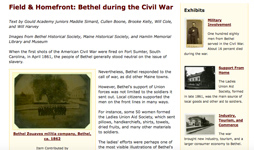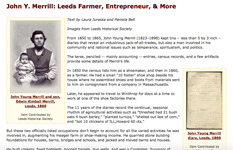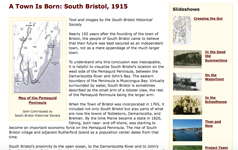Students are important content contributors to Maine Memory Network through digitization and online exhibit projects. Schools can partner with a local collecting institution such as a historical society, library, museum, or archives to help digitize and catalog historical collections for inclusion on Maine Memory Network as a contributing partner. From there, the school and their partner can also help to create online exhibits and other resources for their community. These projects are a great way for students to became engaged in their community, learn about its history, and play a role in sharing that history, all while developing and applying skills in research, critical thinking, writing, technology, communication, and literacy.
Examples of community and school projects
Below are links to the products of community projects between schools and historical partners.
The following links showcase exhibits created by historical societies and their school partners, and the individually digitized items. In most cases, the individual images illustrating the exhibits were digitized and cataloged by students. Projects are designated basic, intermediate, or intensive depending on the level of student involvement.
For examples of community history website projects, visit Our Partners.
Friendship Village School and Friendship Museum
Intermediate: A single elementary classroom participated in the project. Nineteen sixth-graders participated in activities including taking a historical walking tour along the waterfront, hearing from community historians in the classroom, working in pairs to scan photographs and write draft descriptions of them for the cataloging record, and generally researching the topic. One student assisted the historical society representative in writing the exhibit and shares the byline.
Gould Academy and Bethel Historical Society
Intensive: This project involved up to 50 11th grade U.S. History and AP U.S. History students. They took field trips to the historical society, learned to scan and digitally photograph collection items and artifacts, and cataloged those items. The AP U.S. History class researched five different aspects of their town during the Civil War period and five students took the lead on writing the text for the exhibit sections.
Leeds Central School and Leeds Historical Society
Basic: A core group of six students in a sixth grade classroom worked closely with the historical society to handle and analyze historical collections, scan and catalog some of them, and learn more about the selected exhibit topic. They presented their work at a community event.
Spruce Mountain High School and Washburn-Norlands Living History Center (Jay/Livermore)
Intensive: A three-teacher team designed a year-long elective course to carry out the activities of MHS's and Maine Humanities Council's 2014-2015 Local & Legendary: Maine in the Civil War project. The students undertook every aspect of completing the online exhibit from multiple field trips to their historical partner, to all the digitization and cataloging work, to considerable research, writing, and editing, to presenting their work at a final event.
South Bristol Historical Society and South Bristol School
Intermediate: This project revolved around the town's centennial celebration. Sixteen fifth and sixth graders took field trips, selected the collection items to be digitized, scanned and assisted with cataloging them, and wrote sections of the final exhibit.
Early Community Projects with Schools
Saving Hometown History
Article from Access Learning magazine about Skowhegan scanning project
The following projects were Maine Memory's earliest foray into working with schools around the state. These pilots remain powerful examples of students and community members working together to share their local history.
The projects below include online exhibits, physical exhibits in libraries and schools, scanning projects, iMovies, oral histories, and historic preservation campaigns.
Digitization examples
- Lisbon Falls: Phillip W. Sugg Middle School
- Fryeburg: Molly Ockett Project
- Skowhegan Area Middle School







